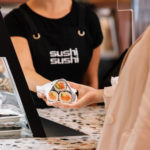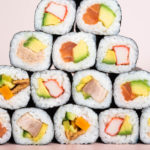How Meneilly found beauty in the stories behind the business of Sushi Sushi
There is a love affair with Japanese food happening in Australia, driven by the cuisine’s seasonality, simplicity and abundance of flavour. Australians are also enamored with the cuisine’s sustainability and ethical sourcing of ingredients – something Scott Meneilly, Director and CEO of Sushi Sushi, quickly came to understand, respect and adore.
Conceived from the idea to bring sushi out of expensive restaurants and into the hands of everyone, Sushi Sushi Franchises opened their first retail sushi outlet in Victoria, Australia, in 1998. Regionally, Japanese food is most prominent in Victoria, with a popularity score of 100, according to marketing research using data from Google Trends to determine how the food of the world ranks on Australia’s palate.

Australia, as it is known, is the land down under – but it is down under Asia – so it should come as no surprise that the traditional cuisine of that region is such a mainstay of the Australian food culture.
Sushi Sushi continues to be a market leader even after more than 20 years in business. Built on a love of delicious and healthy Japanese food and created from the freshest, high-quality ingredients, Sushi Sushi is Australia’s largest and most beloved sushi brand. With over 140 locations across Australia and New Zealand, we recently spoke to Meneilly about his love of the brand, his commitment to quality products and much, much more!
How long have you been in your role with Sushi Sushi?
Meneilly: I started mid-way through 2017. At that point in time, it was still a family-run business and the idea to bring me into that structure was based on a background of a more corporate business perspective. Once this business reached 130 stores, the owners felt as though it was time to shift the strategy to grow through franchising.
What attracted you to join Sushi Sushi in a leadership role?
Meneilly: I’ve been a huge fan of Sushi Sushi for 20 years. Being in the retail market, I have always been impressed by how the stores look, how the food is presented and the fact that it is all about quality, speed and value. I think it is an honest product and people these days know when things are fake and there is nothing fake about Sushi Sushi.
From the business side, I was impressed with the fact that it was so clearly about quality and proven operations. I think that was one of the reasons that it was so successful leading up to my involvement. That struck me as something special – it is always about the food. When I came in with a corporate background, things were completely different than I expected. Seeing as they ran 130 stores, I assumed the business would be quite corporatised with multiple structures in place. But that was actually lacking and to a certain degree that became part of the appeal for me. I saw an area I knew I could contribute to improving. When I came in, I quickly realised that what they had built wasn’t at all about the corporate side of the business as it was about delivering a quality product.
Now that you have spent a good amount of time in the business, what is it about the Sushi Sushi franchise that makes them so unique?
Meneilly: Without question, for me, it’s about the product. Everything that comes off that product steeps into the ecosystem of the business. I am always focused on the return investment, profitability, and thinking, “How can we make this more profitably?” and “How do we get more consumers in the door?” When I first started this role, I was asking questions about all the metrics that feed into the company and how I could help complete the puzzle.
Initially, I was mainly hearing a lot about the quality of products and it struck me that while internally people had an intense and passionate knowledge of the particular type of ingredients (where they came from and why we used them) this didn’t flow to consumer knowledge; how would they know those details? So I started considering ways to save money and cuts that would enhance profitability, potentially without some of those small details. The more I explored the stories about the food, the more I realised we could do better from a cost point of view. However, as I got more immersed in the business, what I understood was how important those stories are to the food and to the company.
A good example of this is the vinegar we use in our rice. It is sourced from Japan in an area at the base of Japanese mountains. They used this specific vinegar because of its purity and because the family history in making for over 140 years. It’s submerged in tradition, meaning and purpose – that is such an important representation of the quality of products and people within the Sushi Sushi franchise group.
While we might be able to source cheaper rice and vinegar, these nuances and stories are what make it special. So although all the customers may not know the stories behind the products (and they just know it tastes good), it is a special aspect of what makes this business successful. It is all of that and the quest for continuous improvement that filters throughout the business.
Part of what is so special about Sushi Sushi is the commitment to excellence. How does the idea of mastery help you in business?
Meneilly: Becoming a master in something doesn’t happen overnight – it happens over years and decades and rests in the patience for perfection. Obviously, from a business point of view, we are trying to condense that in order to see a turnaround a little quicker. But there is truly something in the beauty of that quest and their stories that make this brand so unique and special.
Let the good times roll with our Sushi Sushi franchise opportunity!
Are you ready to invest in a sushi business? Our sushi franchise opportunity is poised for rapid growth in the market and we’d love to help you grow with it. Follow this link to learn more.





